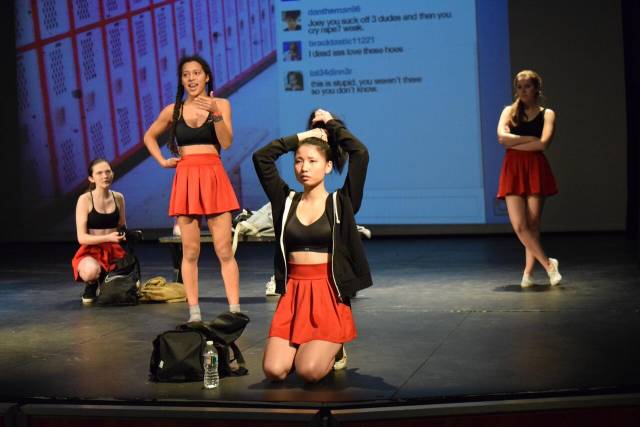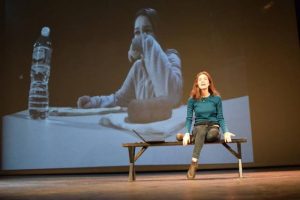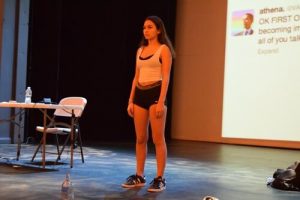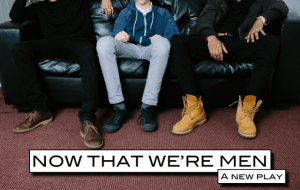

How do you speak up when language does not belong to you? How do you move through the world with agency when your body does not belong to you? SLUT is not an easy play to watch, or even to name out loud. It is not about convenient, easy-to-swallow truths. But it may well be the most important play you'll see all year. SLUT, now onstage at Dixon Place, is developed and performed by young women from the All-Girl Theater Company of the Arts Effect, a theater education program founded in 2007 by Meg McInerney, Managing Director, and Katie Cappiello, Artistic Director and writer of this and several other plays the troupe has performed. Their goal seems basic, but proves radical in its execution—offer a safe space for young women and men to talk about the issues that impact them on a day-to-day basis. Offer them a nonjudgmental ear, and they will invite you into their world.
In SLUT, a fiercely talented group of teens and pre-teens take us into a different locker room conversation than we’re used to. A foursome of popular dance team members high five each other, shove each other and adjust themselves; they haze the newbies ("I'd better not fucking see a smile on your face Freshman") and brag about sexual conquests and partying. But these are young woman, and not young men, and still, in 2016, they do not get to be in control. When one of the members of this proudly self-proclaimed “Slut Squad” is sexually assaulted by two of her male friends during a night of partying and reports the incident to the police, it throws their whole school into turmoil, as friends and classmates try to make sense of what happened, and how sex, gender, love, agency, language and friendship collide in the wake of an assault.
The play has toured across the country as well as internationally, with productions mounted in Australia, Mexico, and Canada. With uncensored language, a current soundtrack, and a realistic inundation of social media communication, the play is an unflinching and realistic glimpse into the lives of teenagers, ground zero for a society in which, according the RAINN, the Rape, Abuse, and Incest National Network, "1 out of every 6 American women has been the victim of an attempted or completed rape in her lifetime," which totals close to 18 million women alive today.
I had the honor of talking with Katie and Meg, who took me into the anatomy of a scene from the play and it's all-too-real inspiration, the power of equipping yourself with language, the challenges of speaking the truth, and the process of creating Now That We're Men, the new, all-male counterpart to SLUT.
What if someone doesn't get the importance of the play, I asked? Well, Katie explained, "Even if someone leaves pissed or leaves feeling like this is propaganda... they sat in the theater for 70 minutes, and girls talked, and they listened. That's 70 minutes that you've never given them before."

Can you give me a bit of history about the Arts Effect and what led the two of you to establish it?
Katie Cappiello: Meg and I were both right out of college, we were both teaching, we both studied theater, with a combination of other things. Meg studied theater and psychology, and I studied theater and women's studies and politics; we didn't know each other in college even though we both went to NYU, [but] out of college, interestingly, we were on very similar paths. We were both running educational nonprofits, we were both teaching, doing a little acting here and there, and a mutual friend of ours said, "You know, you guys should meet, you'll totally love each other." I think both of us on our separate sides were like, "Oh, okay sure," you know, one more person to meet. Meg said, "Why don't you come to my office?"
So I go to Meg's little office, in the basement of this community center, and we sat and we talked, over our coffee and our tea, for like two hours and we just really connected. We're very different people, but we have such complementary strengths and where we really meet in the middle is our passion for kids and theater and introducing kids to theater as a tool for social change. And this was the thing that we were both yearning for. Not to sound cheesy, but we were both like, "Why is this not out there?" We were both working with kids in a theatrical, artistic capacity, but it wasn't as raw as we thought it could be, or as honest as we though it could be. Just get in there and dig deep and let these kids let loose kind of thing. It was really kind of at that point that we were like, "Should we start a business together?" And we thought, "Yes we should!"
And we quit our jobs, and it just so happened that we were living two blocks away from each other in the same neighborhood in Queens, totally serendipitously. And that was that. We started going to each other's apartments and planning, and really at the core, as we were developing this school, we thought, let's create the thing we wish we had when we were 11-year-old girls. What would that be? We wanted a space where we could talk and be honest and be with other girls that made us feel good about ourselves not bad about ourselves, right? Theater really lends itself to that type of bonding and connection. We started with two classes -- two groups of ten girls that we found. Along with running nonprofits, Meg and I were both nannies, so we sort of tapped into our babysitting days and filled our classes, and nine years later, we have somewhere around 350 students, and a number of co-ed classes, but always at the core of what we do is the idea of theater for social change. Theater can amplify the voices of young people and empower young people and along with offering great training, we will always have this activist component to our work.
Some of the girls we saw in the play have been with you since the beginning?
Meg McInerney: Yes. We have had students that have been with us for all nine years. Those girls that were in that original cast were ten years old when they started with us, they're now 19 and they're in college, but they were part of our original cast of SLUT. But we actually now, just because they've grown up and moved on, we have other other girls come through the ranks and fill the roles.
Katie: So many of these girls we've known since they were kids, I mean, fifth, sixth grade. We really feel like it's a privilege watching them grow up and allowing the theater that they're collaborating on, helping to develop, grow up with them too.
Meg: And that's how all of our plays come about. Because SLUT is our third play that we've created, and all plays come out of the lives of these girls. So we start by sitting around and saying, "Okay, what's gong on with you? What's happening?" And these girls are completely uncensored, and they have a chance to share, in a safe space, the truths and realities of their experiences, and there are a lot of so many great things, and there are also challenges. And we don't shame them for those experiences, we encourage them to then take those feelings and transform them into art and create this platform for them to share those voices that are so often never heard.
And you just have to ask them.
Katie: And that's it, that's right! There's no real special, secret thing besides genuinely listening and caring about what's going on with these girls.

Katie, can you talk a bit about how the girls help you develop the script? How significant is their role in the writing process?
Katie: It would be much harder for me to writer this script if I didn't have all of these amazing young artists that inspire the dialogue and inspire the characters and inspire the events that I'm capturing in the play. All the little nuances -- the way that they talk, the way that they engage. The way that we as adults think teenagers approach situations is totally off. We don't really understand how they navigate their lives. We spend an abundance of time with them in a non-judgmental role. We're not their moms, you know? And so many of these girls have really amazing moms or parents, but they're not censored around us. There are things they'll say to us or things they'll demonstrate for us that they don't necessarily want to share with their moms or their aunts or their teachers. So we get a really unique look. For me, it's like, I don't even start the writing process until we've spent a good amount of months just talking about the issue, so just sitting around, listening to them talk, proposing different scenarios, like, let them tell us some story that happened at a house party this weekend, right? Or some warehouse party, or some school trip, and then we say, "Get up and improvise that scenario, let's see how that played out." So it's not just that they're telling me the story, but then they actually to think about the words that would actually come out of their mouth. Because the words that we use when we're telling a story are different than the words that we used in the actual moment, right?
But once I've heard all of that, I’ll go home and start structuring and thinking about how everything we're talking about can actually be dramatized. Cause that's the challenge. There were so many good stories that at first with SLUT we were like, this could be three one act mini plays that aren't connected at all except for subject matter. And then I remembered being like, there's a way of telling all of these stories, and capturing all of these different perspectives, through this one vehicle of this girl being assaulted in the back of a cab. I to this day remember thinking, "Oh my god that might be the vehicle." And I started writing some scenes and brought them in, and everyone gave feedback, and I got language tweaks. That's basically how it works. The characters come out of what I’m hearing from these girls.
I came out of this play, having one-one hundredth of the experience you’ve had with the girls, and I felt so frustrated and so angry. Do you find that these young women bring these same extreme feelings the table, or is it more of a remote concept for them -- do they distance themselves from it? Also, have you noticed any changes in their behavior or the way they speak to each other since going through this process of creating the play?
Meg: Well, to answer the second part of your question, it's twofold. One is that our girls are definitely not immune the the effects of growing up in this rape culture, so they struggle with it on a daily basis for sure, which is what originated the whole concept of this coming about, but we have absolutely seen changes in them and in their peer groups, and trickling even farther out, that have been so positive and so inspiring. So many of our girls, before this play was created, absolutely used the word "slut" and would degrade other girls in that way, and weren't as aware of the dynamics. Now they are complete experts in being able to articulate the ins and outs of this culture and how it affects them, and wanting to be better and see better for their peers, and that's incredibly inspiring. And they inspire that not only within themselves, but then within their friends as well, and we hear constantly about new feminist groups they've started within their school, or just discussions in their classrooms and stuff like that.
Katie: I think the biggest thing is that they're not perfect, right? They're still kids and they're still figuring it out. But I think going through this process has provided them with a couple of things. One is language, the ability to identify some of the things that are happening in their social circles. Because I think this connects directly to your first question -- absolutely, it was a mixed bag, when we first started these conversations, they were making light of so many things where Meg and I would look at each other and be like, "Oh my God, why is she brushing that off? Why is that not a big deal? This guy locked her in a bathroom and wouldn't let her out -- that's real, that came from one of the other girls -- until she blew him. What? What? And she's laughing at that?"

And I mean, is part of that a defense mechanism? Of course. But there's something about our culture and something that happens, because they've internalized sexism, they've internalized rape culture. Some of these girls, they didn't even know how to identify the things that were happening to them and if it's wrong or if it's a violation, or even if it's something that made them feel icky, I mean, not to use kindergarten words, but for real, right? They didn't know. We had one of the girls -- we were having a nighttime hangout, we all got together for pizza -- and one of the girls, she was only 14 at the time, and in the middle of it, tears started streaming down her face, she was so angry, she could barely breathe, and she said, "I'm so angry, I haven't told you guys this, but I was assaulted by my doorman." It was the first time we had heard about it, and we had known this girl for a really, really long time. She'd been in our classes since she was in sixth grade, and now she was a freshman, and she had been molested by her doorman and did tell her parents, but it wasn't until we had started talking about this issue in depth until she knew she had the right to be angry about it. I actually think that was a process too -- we encourage girls to think, "Oh, this is just how it is, deal with it, ignore it, brush it off." Like what we say to third graders when they're like, "That boy made fun of me," or the sixth grade girl who, some boy snaps her bra or makes fun of her, and we always say, "It probably means he likes you, don't worry about it." We teach girls at a very early age to brush this stuff off and try to "ignore it," but when you start to crack it open they do get angry. What I really admire in what I see in the girls today, after they've gone through this process, is that they have language now, they have the ability to identify all of the things that they couldn't label before or call out before.
We can't address things if we can't name them. That's something that we witness with their development and with the evolution of the play. Girls will call us and say, "I feel really bad, I did this shitty thing, was that bad? Was that slutty?" Or they'll say, "I'm so mad at this girl, I was dating him and I heard from my friends that she blew him, what the fuck, I'm so mad." They'll catch themselves participating in this same behavior that the play calls out. But they're teens… and we're 34 and 35 (laughs), so this is an ongoing growth process for us too.
Meg: But what's been really cool, as Katie mentions about girls having ownership of their own experiences too, which is really what this is, we're seeing that in the audience members too. We went to Fargo, North Dakota, and we did a couple of performances there, and during one of the talkbacks, there was this young girl, tears streaming down her face, she stands up and says, "I am now realizing and acknowledging for the first time that I was sexually assaulted, I was raped." And it wasn't until she saw this play that she was given the permission to say that what had happened to her was wrong, and for her to have some type of agency over it. And there was not a dry eye in the entire theater. It was incredibly powerful. There's something so amazing about speaking the truth, that it allows others to have this cathartic experience that is really life-changing.
Can you guys talk a bit about what it's like touring with this show? I saw this show in New York City, an arguably very liberal environment, how does that change in other states, ones we perceive as less open-minded.
Katie: It's not what you'd think. Meg and I would think, there's no way this conversation is going to be well received. On the plane over, we even warned the girls, "You know, this might be a little bit different, so prepare yourselves, but you're doing important work, our job is to speak the truth and this is what were here to do." We couldn't have been more wrong.
I think it kind of goes to show you, that no matter what we see in the media, on the media, on Fox News, on MSNBC, rape is not a political issue. No matter where we go, no matter how big the city or how small the town, every community is touched by rape, is touched by the taboo of rape and the silence around rape and the myths around rape. Even if you're a little put off by the opening scene, or you're a little put off by the crassness of their language or their actions from time to time, you know that's just how kids are when adults are not around. Even if that does throw you a bit, there’s nothing about these girls that you don't walk away empathizing with. You're seeing these young girls, who could be your daughter, living and breathing right in front of you, and they're pouring their hearts out, and it's hard to not be moved by that. I would say in every city that we've gone to, it's been -- shockingly for us -- embraced, even if it's after the fact.

Most surprisingly, because it's where I'm from, we took the play to Boston, and I would say it was, even more so than North Dakota or Minnesota, the most puritanical of all the cities that we visited. We had a really hard time promoting the play there, we got so much pushback, so much negative feedback, schools would never bring their students. We still ended selling out all of the shows, we still had a really great turnout, but it was really challenging. After people saw the show, the superintendent of Cambridge Public Schools came up to me, and said, "I was wrong, I apologize to you. I wish we had sent every single student in our schools to this play, this was a big mistake on our part." Same with the police force -- members of the Boston police force came up to me after the performance and said, "Every police officer in the country should see this play." Because it shows you something that you don't normally see, which is the human side of these girls, the complexity of these girls. So even when we felt pushback, there has been an abundance of support. All it really takes is for someone to sit down and see the play, and it changes their minds. Every once in a while there will be people that aren't going to like it no matter what, because it's girls and sexuality, but for the most part, we can't even believe the response. We went into it three years ago thinking, we do our five shows in Fringe, and then we'll probably shut down and then be done. Now, three and a half years later, this one is practically sold out, and we already have touring spots for next years.
What happens when you’re met with people who just fundamentally don’t get it?
Meg: There are other things that do hit them, that do affect them, that do make them think differently, because I think the play really does do a good job of showing so many different aspects of this culture and the nuances that are there. So if they're not gonna get everything, that's okay. At least they walk away with something that's just a little bit changed within them. That's the goal. Even if it's just for those 70 minutes that they sat there and heard girls speak honestly for the first time because they were forced to do that because they were in the theater and they couldn't turn it off. Even that is a little step. Not everyone is going to walk away seeing the whole big picture.
Katie: And for some people there isn't even going to be that. Meg and I always hope that people are going to walk out a little different than when they walked in. But they may not, and that's the other reality. They just may be so set in their ways. I certainly think that's rare.
What we tell the girls all time is that our job is just to tell the truth, and there are gonna be a lot of people out there who don't like this truth. You know what, we don't like this truth. I don't like it, it's not fun for me.
But it's not about that. The reality is, people are so used to young girls being pleasers. We're so used to young girls getting up and doing the thing we want them to do and saying the thing we want them to say. And giving the cute smile and the flip of the hair, and that's just not what these girls do. We tell them all the time -- it's just not their responsibility. And they worry all the time that people won't like them, or that people won't take anything from it, and it's just like, who cares? That's not your job. Even if someone leaves pissed or leaves feeling like this is propaganda -- because Meg and I have been accused of brainwashing the girls with feminist propaganda -- they sat in the theater for 70 minutes, and girls talked, and they listened. That's 70 minutes that you've never given them before.
 Could you guys talk a bit about Now That We're Men, the all-male counterpart to SLUT?
Could you guys talk a bit about Now That We're Men, the all-male counterpart to SLUT?
Katie: Even though you don't see the boy characters in the play, they feel very present, especially Tim. There are so many people who come up to us, especially young men, and tell us that their favorite character in the play is Tim. You never see Tim, you don't even hear his voice. You only hear his voice through his conversation with his sister. But they feel like he represents so much of the conflict that they're up against every time they're out. The social sacrifice that comes from standing up to their friends. Making the right choice is hard and feels almost impossible at times.
People have always said, what about the boys’ perspective? And that's true, so for all of the fall I met with a group of boys that are in the advanced acting class that I teach -- I picked a group of guys who Meg and I have known for a while, and I feel confident working with, and who come from all different parts of New York and have different perspectives. I said to them, I want to do this companion piece with SLUT, where it's the boy perspective on rape culture, and all different things -- pornography, what it means to come into your sexuality when you're young and male -- would you be interested? And before I could even finish the sentence, they were all like, "Yes! Yes, we want to do it! No one ever talks about this shit, but we want to do it." So I spent about twelve hours a week with them for about two months, and then I was able to start writing the script. We put on our first performance in December, and really the point is that we can have a ton of conversations with our sister feminist organizations and tons of collaborations with women's rights group and groups on campuses across the country, but until we start examining what it means to be young and male, and looking at these impossible standards of masculinity that these boys are encouraged to meet, we're not really getting to what's motivating what's happening in the back of that cab. What is going on in the social circles in the minds of young men, in the development of these guys that's even allowing that to happen.
As much as we want our female students to have access to Title IX, and we want them to have access to legal support if or when they're raped, more than anything we just don't want them to be raped. And we don't want all the young men that we know and we love to rape people. So having this piece has been really exciting, because it's just the other side of the story. You take all the pressure that these boys are under, and all the pressure that these girls are under socially, and then you throw alcohol and weed into the mix, and it's fucking explosive.
Meg: Living in this culture doesn't feel good for boys or girls. So for us, we're not excusing the behavior that's happening at all, but it's not wrong to give them a chance to share their voices as well. Then we can understand both sides and hopefully get to the root of some of these problems, so that were preventing it from ever happening.
Katie: These boys are amazing. It's really hard to be open when you're talking to a 35-year-old woman about this stuff, but they totally did it. What's really telling is how few boys can accurately identify sexual assault. If you can't identify it, how would you know if you're doing it? We're not giving excuses, we're not -- they just don't know what's going on. They don't know where the lines are, they have no idea. And that's pretty scary.
Meg: We've been hearing from the girls for a few years now, about their guy friends, and they have conversations with them. Like we were saying before, a lot of our girls created Stop Slut groups in their schools. One in particular, they had a group of all girls that would sit and meet, and then they had a group of all boys that would sit and talk, and then they brought the two groups together for one big conversation. And during that time, one of the girls asked, "Okay girls, how many of you have ever done something sexually that you didn't really want to do?" And every single one of them raised their hand. And the boys were shocked -- they couldn't believe it. They were like, "What do you mean you guys are doing stuff you don't want to do?"
Katie: And not to say that every instance of that is assault either, absolutely not.
Meg: No, but there are no clear lines and boundaries and communication happening between consenting partners, so it gets really confusing to know when to stop, and when you throw alcohol or drugs into the mix, it just complicates it even more. Those dynamics are important to understand.
And we can't move forward if we're not talking about it.
Meg: We have to able and willing to be honest about what that looks like, and not just glorify it or gloss it over or make it simpler than it actually is, because that's easier for us to process. Too bad -- it's complicated.
And that's what we're hoping these two plays will do together, start that conversation.
We'll see how it goes.
Performances of SLUT The Play continue at Dixon Place through March 6.